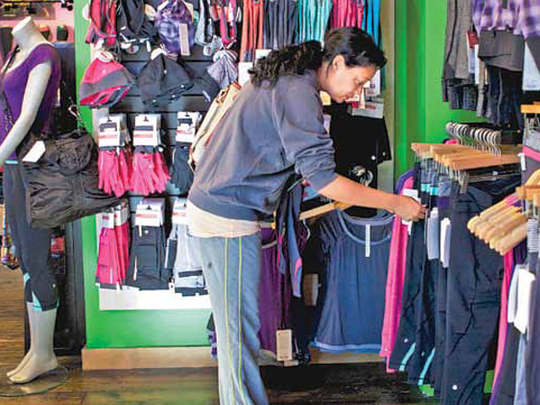
Toronto: Lululemon, the hip Canadian chain that made yoga apparel fashionable, has taken its fight for market share to the courts with a patent lawsuit, as new brands of active wear seek to undercut its premium prices.
The lawsuit filed by Lululemon Athletica, which cultivates a mellow yoga vibe in its stores, comes as investors indicate growing unease over the company’s future. Whether the lawsuit, filed in a US court, will shore up the company’s position remains to be seen.
Patent lawsuits are uncommon in apparel and can be difficult to win. The suit could deter imitators, and thus help the Vancouver-based company cement its growth. It also highlights how tough the competition is.
“This is a low barrier-to-entry industry. Lululemon, their success, has drawn new competitors throughout the mall,” said independent retail analyst Brian Sozzi. “The valuation is so high. It’s tough to warm up to a stock when you see so many new competitors.”
In the suit filed in federal court in Delaware on August 13, Lululemon accused PVH Corp’s Calvin Klein brand and manufacturer G-III Apparel Group of infringing three patents on the design of its yoga pants. Design patents protect the appearance of goods, in contrast to more common utility patents, which focus on how things work.
“What Lululemon is doing here is staking its turf,” said Jeremy de Beer, an intellectual property expert and law professor at the University of Ottawa.
Founded in 1998, Lululemon took Canada and then the United States by storm with costly, colourful, fashionable workout gear targeted at professional young women. Its shares are up seven-fold since its 2007 initial public offering, and now trade at 46 times earnings.
De Beer compared Lululemon’s suit to tech sector patent wars, such as the high-profile trial between Apple and Samsung, now drawing to a close.
“The business strategy is to deter other people from even trying to copy designs, because it’s going to cause them legal problems,” he said.
Shares fallen
Lululemon investors could be forgiven for hoping for good news. The shares have fallen nearly 17 per cent in the last three months, although they are still up 26 per cent year-to-date.
The chain is expanding rapidly, and earnings consistently beat expectations as it posts same-store sales gains upwards of 20 per cent. But the stock swoons at any hint that sales growth might slow, and it has attracted significant interest from short sellers, who bet on making money from a falling share price.
The company says it competes with athletic apparel heavyweights such as Nike by offering better quality, and it maintains its enviable margins by taking charge of every stage of the process — from design, to production, to sale.
But Sozzi said some new products match Lululemon’s quality, even though they are 30 to 40 per cent cheaper.
Gap opened 11 standalone Athleta stores last quarter, bringing its total to 22. The banner features workout gear and free in-store fitness classes, like the free yoga classes that helped build Lululemon’s profile.
Closer to home, some tastemakers have been talking up privately held Coalision’s Lole, sold in sports stores and about half a dozen own-brand boutiques in Canada and France.
Tough sell
Lululemon’s filing says some Calvin Klein “Performance” pants infringe patents on its “Astro Pant.” Two of the styles singled out were recently listed online at $39.99 (Dh146) and $60.00 before discounts, compared with $98 for the Astro.
In court, Lululemon will have to show that its rival’s products look like the patented pants. The other side can strike back with “prior art” — evidence that others made similar products before Lululemon.
“It’s kind of difficult in clothing to design something which is completely new, because, you know, the history of clothing design goes for several thousand years,” said Alexander Poltorak, chief executive of General Patent Corporation.
Design patents often protect patterns on fabric, wallpaper and the like, said Poltorak, whose company administers patent licensing and enforcement for clients.
Adrian Pruetz, a partner at US law firm Glaser Weil Fink Jacobs Howard Avchen & Shapiro who has represented Nike in some patent suits on the design of its running shoes, said apparel is “difficult to protect.”
“It’s very hard to come up with something that’s new and that hasn’t just been part of the clothing vernacular,” she said.
Handling setbacks
There is no doubt Lululemon helped popularise yoga gear, especially stretchy pants with wide, flattering waistbands.
Many attribute Lululemon’s success to a sense of community in its stores. But the company, which wants to double the number of stores it has in North America to 350, is also in it to win.
Chief Executive Christine Day, who built her career at Starbucks and took over as CEO in 2008, often says Lululemon is pushing to become the number one women’s athletic apparel brand. A company manifesto calls for one, five and ten-year goals and exalts readers to “dance, sing, floss and travel.” It has some words on adversity too.
“Life is full of setbacks,” it says. “Success is determined by how you handle setbacks.”











